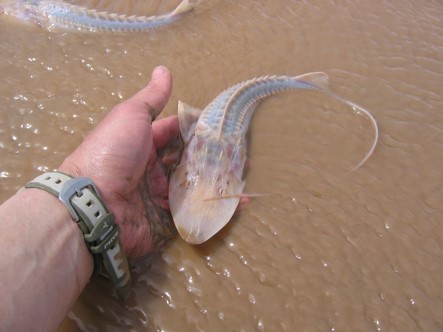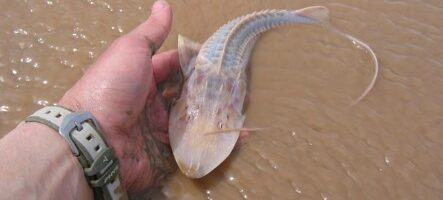February 12, 2024
The 14th Conference of the Parties (COP14) to the Convention on the Conservation of Migratory Species of Wild Animals (CMS) commenced on February 12 in Samarkand, Uzbekistan, amid heightened concerns raised by environmental groups over the peril facing various species due to the extensive construction of dams and reservoirs in Central Asia.
Rivers without Boundaries international environmental coalition, has sounded the alarm on the escalating threat to biodiversity in the Amu Darya River basin, highlighting the adverse impact of hydroelectric projects on critical fish species listed in the Red Book.
One of the primary concerns raised by experts is the plight of the Great Amu Darya Pseudo-shovelnose, a unique sturgeon species native to the region. Changes in the river’s flow, induced by the construction of reservoirs and dams, obstruct fish migration routes, challenging the survival of these species. Similarly, the Syr Darya Pseudo-shovelnose has been deemed extinct due to the proliferation of dam projects along its tributaries.
The recently published World Bank assessment of the environmental impact (ESIA) of the Rogun hydroelectric power station in the Amu Darya basin fails to address the potential ramifications on rare fish populations. The absence of critical evaluation concerning species like the pseudo shovelnose, classified as critically endangered by the International Union for Conservation of Nature (IUCN), raises significant concerns among conservationists.

Furthermore, the disappearance of the Aral salmon, once abundant in the Amu Darya and Vakhsh rivers, underscores the devastating consequences of unchecked hydroelectric development. The Tuyamuyun hydroelectric complex and the Vakhsh cascade of hydroelectric power stations have eradicated Aral salmon populations from their natural habitat, with the construction of the Rogun hydroelectric station further exacerbating their plight.
Eugene Simonov, the international coordinator of Rivers without Boundaries, condemns the wanton sacrifice of ecological health in the pursuit of hydraulic projects, emphasizing the need for stringent adherence to environmental regulations across Central Asia.
“Despite the requirements of national legislation regarding the assessment of environmental impact and the protection of rare species, in all countries of Central Asia, rivers, their valleys, fauna and flora that depend on their ecological health – all this is massively sacrificed during the implementation of ill-founded projects of hydraulic structures. To date, the design and construction of most dams throughout the region has not seriously attempted to prevent harm to populations of rare migratory species,” Eugene Simonov noted.
Similarly, Alexander Kolotov, coordinator of the environmental coalition in Central Asia, calls for a more conscientious approach in selecting sites for energy infrastructure projects to mitigate adverse impacts on natural ecosystems:
“Failure to consider the potential impacts of hydroelectric power plants on rare migratory species and natural ecosystems is not only a gross violation of international environmental conventions, but also often contradicts the environmental policies of those development banks that are going to provide loans for the creation of reservoirs. We hope that discussions during the conference of parties in Samarkand will contribute to the introduction of more responsible approaches to the selection of sites for the placement of energy facilities, and above all dam hydroelectric power plants as the most dangerous hydraulic structures for nature,” Alexander Kolotov voiced.
The Convention on the Conservation of Migratory Species of Wild Animals, signed in 1979 in Bonn, Germany, serves as a pivotal framework for international cooperation in safeguarding migratory species. With 133 member countries, the convention seeks to establish conservation measures to protect vulnerable species throughout their migratory ranges.
Rivers without Boundaries, comprising a network of non-governmental organizations and experts, remains steadfast in its commitment to protecting transboundary rivers and advocating for sustainable river basin management practices. As discussions unfold at COP14 in Samarkand, the coalition’s call for proactive measures to safeguard biodiversity resonates as a clarion call for urgent action in the face of mounting ecological challenges in Central Asia.
In fact, environmentalists and human rights activists have raised concerns on January 24 regarding the potential environmental and social ramifications of the Rogun hydroelectric power station project on the Vakhsh River within the Amu Darya basin. The international environmental coalition Rivers without Boundaries is urging prominent international development banks, considering financing for the project, to initiate public dialogues regarding the updated environmental assessment. The coalition, alongside other environmental and human rights groups in Central Asia, is advocating for inclusive discussions not only within Tajikistan but also across Uzbekistan, Kyrgyzstan, and Kazakhstan. They stress the importance of engaging all relevant public and scientific organizations to ensure a thorough examination of proposals, feedback, and identified deficiencies in the revised project.
The Rogun hydroelectric power station project entails the construction of a 335-meter dam on the Vakhsh River, leading to the formation of a reservoir fraught with substantial social and environmental risks. The coalition highlights the necessity for comprehensive regional discussions concerning the potential transboundary impacts of the project, which are presently lacking.


